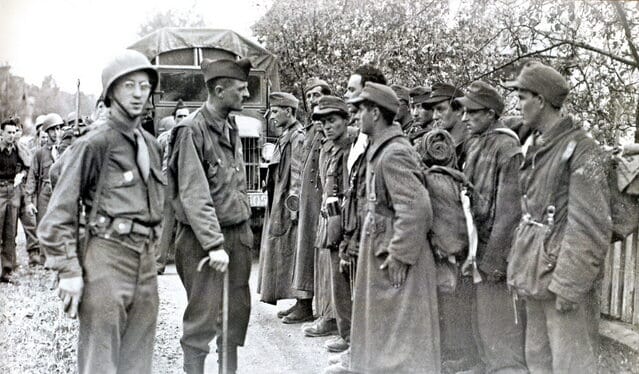A French public radio France Culture published a material which accuses Poland of an alleged attempt to prohibit mentioning „(…) its responsibility for crimes committed by the Third Reich”. Moreover, Frenchmen illustrated their material with a photography from April 1939 showing flags of the Third Reich and the Free City of Danzig with an inscription „Gdansk, Poland”. This defamatory material was created in connection with the regional court’s judgement ordering Barbara Engelking and Jan Grabowski to apologise for misinformation included in their book.
In their role as guardians of historical memory the French forgot about their own dark pages of history from the period of World War II. Until the end of 1941, over 24 000 Frenchmen, Croatians, Spaniards and Belgians voluntarily joined the Wehrmacht[1]. French supporters of Adolf Hitler such as Jacques Doriot or Marcel Déat regarded military cooperation with the German army against the Soviet Union as an opportunity to tighten the alliance between France and Germany. Although the Wehrmacht was initially opposed to this idea, Frenchmen managed to create a unit of volunteers. Their baptism of fire came already in November 1941 when 2452 soliders of Légion des Volontaires Français contre le Bolshevisme (LVF) were sent to fight in the isthmus near Kubinka, only 137 kilometers away from Moscow. During this operation, LVF functioned as a unit incorporated into the Wehrmacht (638th Infantry Regiment)[2].
These were the French themselves who remained loyal to Hitler until the very end defending Berlin against Soviet and Polish armies founded in the East. German commander of the French SS divison dr Gustav Krukenberg gave his soldiers an opportunity to resign from further fighting. However, most of the French volunteers decided to fight for Hitler until the end[2]. As one of the members of this formation said, they were a group of „(…) 450 enthusiastic and singing men going into battle” [4].
French SS-men fought in encircled Berlin, among others, on the alley of the old Friedrichstadt. By attacking Potsdamer Platz station, they made one of the last efforts to defend the capital city of Nazism. The determination of French soldiers resulted in pushing their opponent back to the Ministry of Aviation. The above-mentioned example is only one of many dark pages of history written by the French during World War II. The attack provoked by the French radio cannot be seen as accidental because it is visibly consistent with series of defamatory and deceptive attacks aimed at reversing the role of Poland from victim to criminal. It is a kind of media war and Poland, unfortunately, has been losing it for years on a global scale.
Tłum. Dominik Liszkowski
[Wróć do tekstu w języku polskim]
Podoba Ci się to co robimy? Wesprzyj projekt Magna Polonia!




